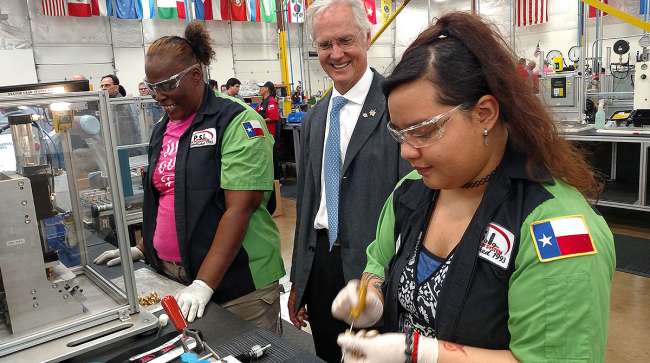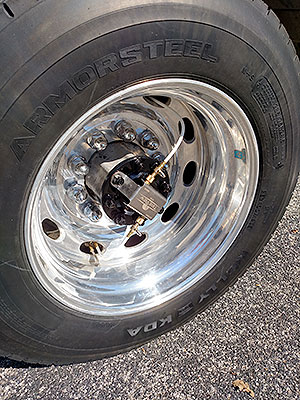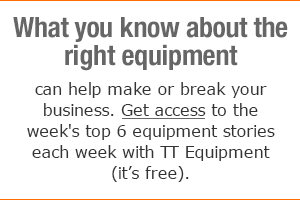PSI Marks Silver Anniversary by Looking Back, Ahead

It has been 25 years since a Texas family purchased the patent for a device that would keep truck tires inflated, a move that proved prescient.
“Since ’93, fuel prices tripled, [and] tire prices went up 75%,” said Tim Musgrave, CEO of Pressure Systems International, the company that the Berry family from Corpus Christi founded with that patent. They hired Musgrave away from the restaurant industry to run it.
In the intervening years, PSI has “grown much more than we expected,” he said, with 1.4 million trailers now equipped with the automatic tire inflation system.

The TireView pressure monitor and warning device will soon join Meritor Tire Pressure Inflation System by P.S.I., which now goes on 40% of all new trailers in North America, the company says. (Tom Berg for Transport Topics)
Musgrave and other executives from PSI took the occasion of this anniversary to discuss how the tire market has changed since PSI’s inception and also where it’s heading, during Meritor’s annual Fleet Technology Seminar Oct. 9-10 in San Antonio.
Meritor is PSI’s longtime partner on the product.
Early on, the notion of a system that would automatically inflate tires was a hard sell, Musgrave said. The company found early adopters with railroads and steamship lines that owned container chassis that too often had flat tires.
“They’re what put us on the map,” Musgrave said of the container chassis segment.
Another boost came via the marketing and field support agreement PSI and Meritor signed in 1997, which led to the product becoming known as the Meritor Tire Pressure Inflation System by PSI. From there, broader industry adoption came as fleets began to see potential benefits.
For one, pre-trip inspections could be shortened by about 10 minutes since tire-pressure checks would be made easier, said Jim Sharkey, PSI’s vice president for global sales and marketing. He noted that if tires on a parked trailer lose air, the system will pump them up soon after a tractor hooks to it.
“It just takes too long to check the tire pressure on 18 tires,” quipped Al Cohn, PSI’s director of market development and engineering support.
Plus, keeping tires properly inflated helps prevent punctures, sidewall damage and excessive heat generation that can cause blowouts, Cohn said. For wide-base tires in particular, underinflation produces a large footprint that creates higher rolling resistance, which wastes fuel, he said.
According to Sharkey, proper inflation extends tire life by 10% and fuel economy by 1.4%.
Today, the company includes as standard equipment a sensor that provides early warning of overheating and fires in wheel ends. Soon PSI will add a tire-pressure monitoring and warning system, the result of acquiring a company that previously served the recreational vehicle market. PSI also has plans to expand beyond its current trailers-only focus to include power units.
Pneumatic plumbing for trailer inflation systems runs through hollow axles, which cannot be done with trucks since their axle housings contain gears and shafts. PSI’s power-unit product will use external air lines but retain a hub-mounted rotary valve to connect stationary axle hardware to spinning wheels and tires.
These new products should enter the market next year, Sharkey said.
The Meritor-PSI system is sold in North America and 42 overseas countries, including China. As volume grows, PSI might someday shift some production to China, Sharkey said, but for now, most production is handled in its 44,000-square-foot facility in San Antonio, with 55 production workers and another 25 administrative staff. Some components from the facility are shipped to Europe.
“Without these guys we’re nothing,” Musgrave said of the company’s staff.
At the seminar’s opening session, TCW Inc. president and American Trucking Associations chairman Dave Manning in an address praised both companies’ participation in the federation, noting the importance of hearing the perspective of suppliers to the industry.
“We need legislators and regulators to understand the issues that have ramifications beyond trucking companies,” he said.
Among the issues confronting fleets, he offered support for the congressional DRIVE-Safe Act, which would permit 18- to 20-year-old drivers to drive Class 8 trucks interstate after extensive training and supervision. He also noted that the industry could benefit from adjustments to hours-of-service rules, including possible expansion of air-mile and work hours frameworks proposed by the Federal Motor Carrier Safety Administration.




